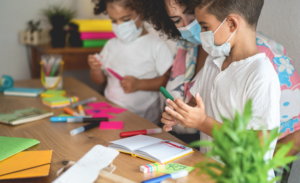Blog
04/09/2021
Pass It On
Since the beginning of the COVID-19 pandemic, life has been increasingly difficult for most Americans. Many have lost family members, friends, livelihoods and the much-needed sense of stability. Since May of last year, a staggering 8 million people in the U.S. have fallen into poverty due to record setting unemployment rates [1]. It can be easy to feel hopeless, but it is important to realize you are not helpless. Read on to learn surprising ways you and your children can give back in this time of need, while staying safer at home.
HOW TO HELP
GIVE TIME
- Create cards or video messages to cheer up lonely nursing home residents or soldiers overseas.
- Volunteer in your neighborhood. Help with yard work or run errands for neighbors who are in quarantine or need extra help. Make sure to follow local and CDC recommendations when helping.
- Pick up litter or plant flowers/trees to clean and beautify your neighborhood.
GO VIRTUAL
- Help the visually impaired. Apps such as Be My Eyes and BeSpectacular pair a visually impaired individual with a sighted volunteer to help with locating information or objects through the app’s video chat platform.
- Provide supplies to struggling communities for free. Visit The Hunger Site and click the link to give for free, no signup or information needed.
- Visit VolunteerMatch.com for more virtual volunteering opportunities
MAKE A DONATION
- Donate to nonprofit organizations like Children’s Bureau. Some employers even sponsor matching gift programs to make your contribution go even further.
- Shop to give. A portion of sales go directly to nonprofits such as Children’s Bureau at no cost to you.
- Purge closets and pantries for clothing and food drives.
- Donate your old computer equipment or books to a community center.
- Give used blankets and towels to a local animal shelter.
BENEFITS
Giving back to your community through donations or volunteering has many well-documented psychological benefits, to not only the recipient but the volunteer as well.
Depression rates have tripled since the beginning of the pandemic and children and teens are not immune. Children and teens are reporting increased levels of isolation, depression and anxiety. Volunteering can offset feelings of isolation and depression, providing a sense of purpose and accomplishment.
“[Giving back] can also make someone feel needed and improve their self-confidence,” says Susan J. Noonan, MD.
Involving your children in charitable activities teaches them compassion and empathy for others. Getting involved is also a great opportunity to gain work experience & new skills, explore new interests, and make a difference.
Teaching children to give back is one of the most valuable lessons you can teach them as they get older.
GIVE HOPE
Empowering children and teens to make a positive difference during this tough time can not only lift their mood but shape their life. Make it personal by asking your children what they are passionate about and find related organizations to support. Though COVID-19 has changed the way we give back, the need has never been greater.
“Kindness is like snow. It beautifies everything it covers.” -Kahlil Gibran 
Written By:
Samantha Edgerton
Samantha Edgerton joined Children’s Bureau as a Social Media and Marketing intern in October 2020. She graduated magna cum laude from California State University Dominguez Hills, with a Bachelor’s in Advertising and Public Relations, and is excited to turn her passion for helping people into a career.
Sources:
- https://www.cidrap.umn.edu/news-perspective/2020/09/depression-triples-us-adults-amid-covid-19-stressors
- https://www.psychiatrictimes.com/view/new-findings-children-mental-health-covid-19
- https://www.psychologytoday.com/us/blog/view-the-mist/201606/volunteer-when-depressed-the-life-you-save-may-be-your-own

